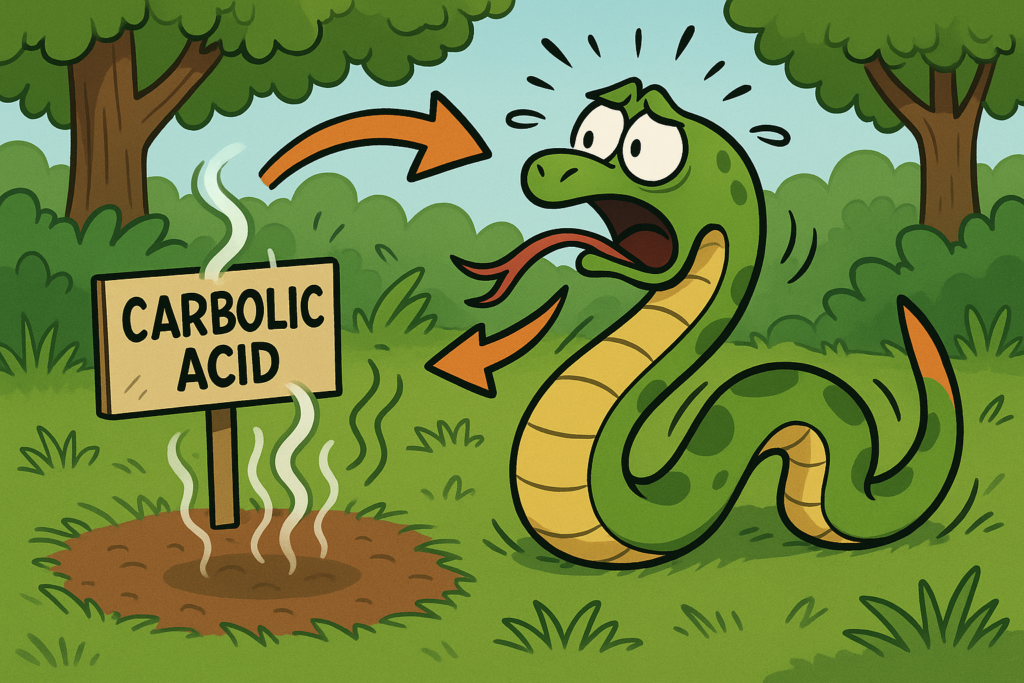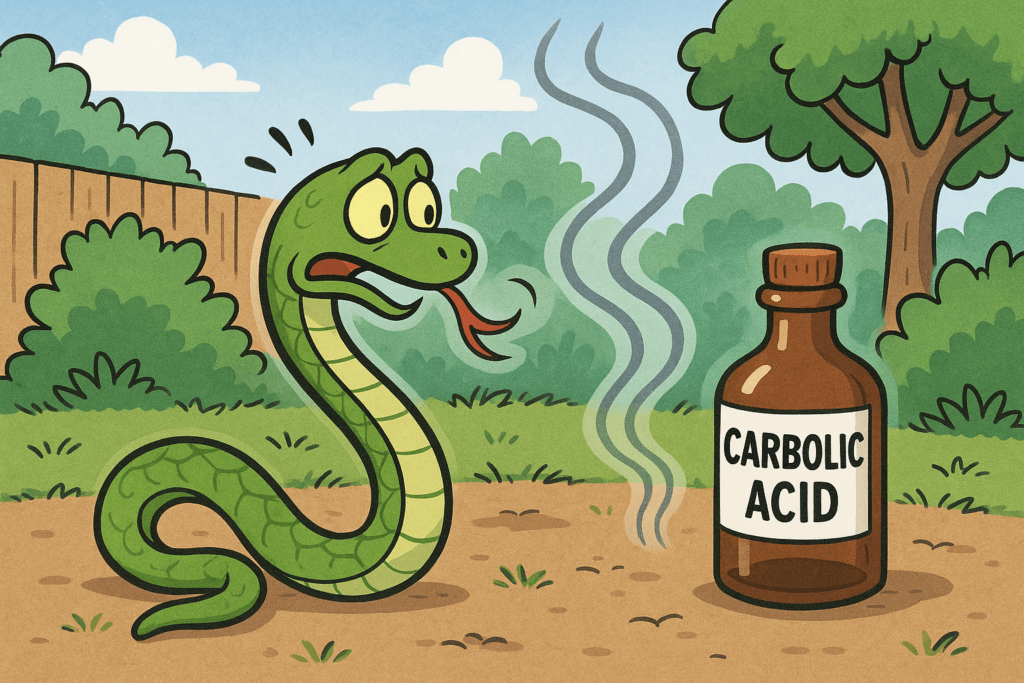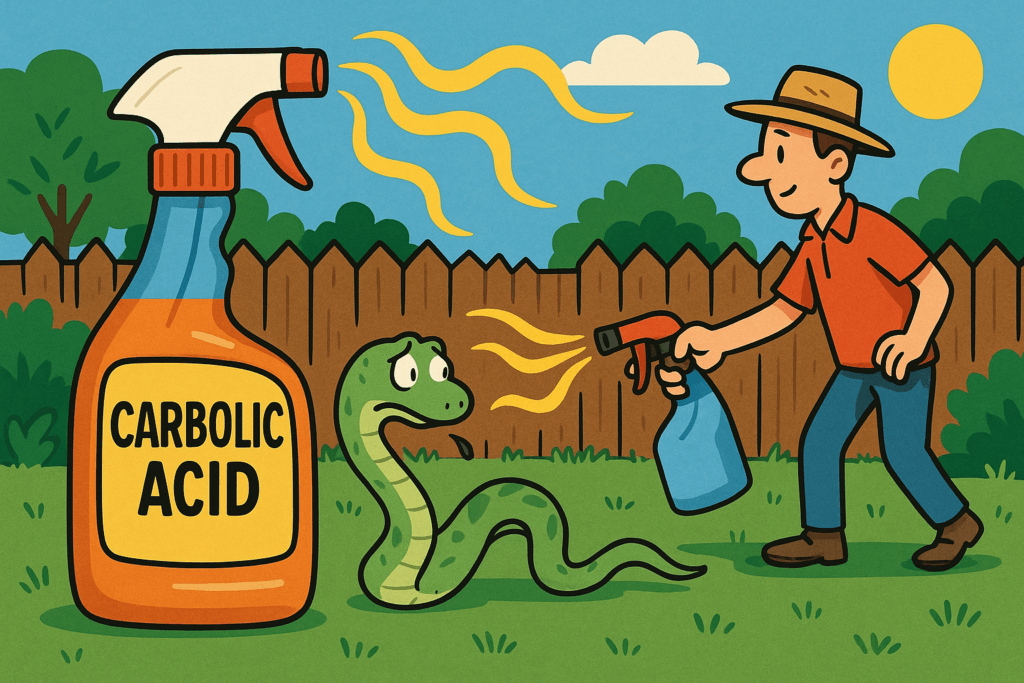Imagine walking through your garden or backyard and suddenly spotting a snake slithering by. The fear and panic that rise in such moments are understandable. But what if I told you there’s a simple and natural solution that could help keep these creatures away? Carbolic acid, which is commonly found in household disinfectants, is proving to be an effective snake repellent. It’s an affordable, natural method that’s been used for ages to deter snakes and other pests. In this blog post, we’ll explore how carbolic acid works, its benefits, and how you can use it to protect your home and garden from unwanted snake visitors.
What Is Carbolic Acid?
Carbolic acid, also known as phenol, is a chemical compound made from organic material. It has a sharp, distinct odor and is used in a variety of products, including disinfectants, antiseptics, and cleaning agents. Carbolic acid has strong antimicrobial properties, which is why it’s commonly found in products designed to sanitize surfaces.
While it’s well-known for its use in cleaning, carbolic acid also possesses the remarkable ability to repel snakes. This makes it not only a valuable cleaning agent but also an effective natural snake deterrent. It works by creating an unpleasant environment for snakes, who rely on their highly sensitive sense of smell to detect threats, food, and mates. The strong aroma of carbolic acid disrupts their sensory perception, making it an ideal tool for keeping these slithering creatures away.

How Does Carbolic Acid Work as a Snake Repellent?
Carbolic acid’s effectiveness as a snake repellent lies in its powerful and distinct smell. Snakes use their sense of smell to navigate their environment, locate food, and find potential mates. The strong odor of carbolic acid interferes with their sensory systems, making them avoid the area where it has been applied.
Snakes have a unique olfactory system that allows them to detect even the faintest of scents in the air. When exposed to carbolic acid, this strong odor becomes overwhelming to them. It disrupts their natural behavior and causes them to leave the area in search of a more favorable environment. The best part is that carbolic acid doesn’t harm the snakes in any way; it simply makes the area inhospitable, forcing them to move on.
This makes carbolic acid a great option for homeowners looking for a non-lethal, eco-friendly solution to snake problems.
The Science Behind Snake Behavior and Carbolic Acid’s Effect
To understand why carbolic acid works as a snake repellent, it’s essential to dive into some science. Snakes don’t rely on sight as much as humans do. Instead, they depend heavily on their sense of smell, which is highly developed. They use their forked tongues to “taste” the air, collecting molecules that give them information about their surroundings. These molecules enter a part of their brain known as the Jacobsen’s organ, which is highly sensitive to chemical signals.
The Amazing Polar Day and Polar Night: Why the Sun Doesn’t Set or Rise for Months?
When carbolic acid is introduced to the environment, it overwhelms their olfactory system, which is why snakes react by avoiding the treated areas. The strong smell of carbolic acid confuses them, making it harder for them to detect other scents, such as food or potential threats. In other words, carbolic acid interferes with their ability to “read” the environment, making it an effective repellent.

Using Carbolic Acid as a Snake Repellent: How to Do It Safely
While carbolic acid is a powerful tool for repelling snakes, it’s essential to handle it with care, as it is a potent substance. Here’s how to use carbolic acid safely and effectively:
- Choose the Right Product: Carbolic acid is commonly found in disinfectants and antiseptic products, but it is often in a diluted form. Make sure you’re using a product that’s safe for the environment and follow the manufacturer’s instructions. You can also dilute pure carbolic acid with water to achieve the desired strength.
- Prepare a Spray Solution: Mix a small amount of carbolic acid with water in a spray bottle. The solution should be strong enough to release an overpowering odor but not so concentrated that it causes harm to plants, pets, or people.
- Spray Strategically: Apply the carbolic acid solution to areas where snakes are likely to enter, such as doorways, around your yard, near garden beds, or along fences. Be sure to spray thoroughly, covering all entry points.
- Caution Around Pets: Carbolic acid can be harmful to pets if ingested or if it comes into direct contact with their skin. Make sure to keep pets away from areas that have been sprayed. If you have pets, consider using diluted solutions and applying them in areas that pets don’t frequent.
- Reapply as Needed: The effects of carbolic acid may wear off over time, especially after rain or heavy winds. To maintain its effectiveness, reapply the solution regularly. Make sure to check the treated areas after a few days to see if the scent is still present.
Benefits of Using Carbolic Acid Over Chemical Snake Repellents
While there are various commercial snake repellents available, carbolic acid offers several significant advantages that make it a preferable option for many homeowners:
- Eco-Friendly and Natural: Unlike chemical repellents that contain harmful substances, carbolic acid is a natural compound. It doesn’t pose the same environmental risks, making it safer for pets, plants, and wildlife.
- Cost-Effective: Carbolic acid is relatively inexpensive compared to other snake repellent products. It’s also easy to find and use, so you won’t need to invest in expensive, branded repellents.
- Multipurpose: Carbolic acid is more than just a snake repellent. It also works as a disinfectant and cleaner, so you can use it for general cleaning around your home and garden. This makes it a versatile household product.
- Non-Lethal: Unlike some chemical snake repellents that may harm or kill snakes, carbolic acid simply causes them to leave the area. This makes it a humane solution for dealing with snakes.
Real-Life Examples of Carbolic Acid as a Snake Repellent
Carbolic acid has been used successfully in many areas to keep snakes at bay. One example comes from a homeowner who lived in a rural area where snakes were frequently spotted near their vegetable garden. After trying several store-bought repellents, the homeowner started using a diluted carbolic acid solution around the garden perimeter. Within weeks, they noticed fewer snake sightings and were relieved that the solution was effective.

Another example comes from a farmer who faced challenges with venomous snakes entering their fields. After using carbolic acid mixed with water around the farm’s boundaries, the snakes seemed to avoid the treated areas, allowing the farmer to carry out their work without fear of encounters.
Other Ways to Keep Snakes Away from Your Property
While carbolic acid can be highly effective, it’s best to combine its use with other preventive measures for maximum results. Here are some additional tips to help keep snakes away from your property:
- Seal Entry Points: Snakes can enter through even the smallest cracks and holes. Inspect your property regularly and seal any openings to prevent them from sneaking inside.
- Remove Food Sources: Snakes are often attracted to areas with plenty of food, such as rodents. Keeping your yard clean and free of food scraps can help reduce the likelihood of snakes visiting.
- Install Snake-Proof Fencing: Consider installing snake-proof fencing around your property. This can be especially helpful if you live in an area known for frequent snake sightings.
- Keep Your Lawn Trimmed: Snakes love to hide in tall grass and overgrown bushes. Keeping your lawn short and tidy makes it less likely that snakes will make your yard their home.
Conclusion
Carbolic acid is a simple, affordable, and effective solution for deterring snakes from entering your property. By using its strong odor to disrupt their sensory systems, it encourages snakes to move away without causing harm. Whether you’re dealing with a snake infestation or just want to keep them at bay, carbolic acid provides a safe and eco-friendly alternative to other chemical repellents.
Can carbolic acid harm plants?
Yes, carbolic acid can harm plants if applied in excess. Use it carefully and avoid direct contact with plants.
Does carbolic acid work for all types of snakes?
Carbolic acid is effective against most types of snakes, but its effectiveness can vary depending on the species and the environment.
Can carbolic acid be used indoors?
While it’s primarily used outdoors, you can also use it indoors in areas where snakes are a concern. However, ensure pets and children are not exposed to it.
How often should I reapply carbolic acid as a snake repellent?
Reapply the solution every few weeks, or after rain, to maintain its effectiveness.
Is carbolic acid harmful to pets?
Yes, carbolic acid can be harmful if ingested by pets. It’s important to keep pets away from areas that have been treated with carbolic acid.
